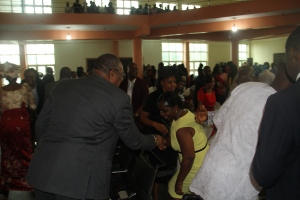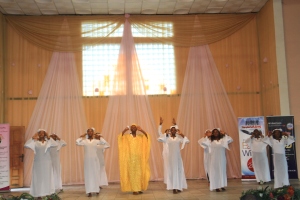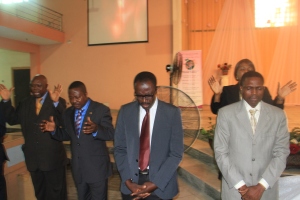
Sunday 27 July 2014 (End of July Fast)
“But now I will not treat the remnant of this people as in the former days.’ says The Lord of hosts. For the seed shall be prosperous, the vine shall give its fruit, the ground shall give her increase, and the heavens shall give their dew – I will cause the remnant of this people to possess all these” (Zechariah 8:11-12).
At the inception of the July fast, God spoke to us through a Guest Speaker from Zechariah 8:19. I have every reason to believe what this passage says that we shall end the fast in “joy and gladness and cheerful feasts.” As I have stated at different occasions, one of the main reasons for our one month long fast is to secure an improved relationship and closer intimacy with God, as our Father. Knowing God more intimately is the ground upon which all other blessings flow. When a child reconciles with his father, it eventually gives rise to joy, gladness and cheerfulness.
Zechariah chapter 8 is about God’s promised restoration to the nation of Judah and to the city of Jerusalem. After punishing Judah for her sins, God decides to change his disposition towards her- to bless her and lift the curse and judgement on her. Judah’s restoration to a place of favour was dependent not on her past, but on the faithfulness and righteousness of God. All that God required of her was for her to live in truth with her neighbours, show justice, righteousness and equity in her dealings. Zechariah 8 shows how amazing God is, and His sovereign ability to turn impossible situations around for His children. Like most other scriptures, the promises that are made to the remnant in Judah are also applicable to us, the Church.
God’s promises to Judah are ten-fold and found in the following verses of the chapter: verses 2,3,4,6,7,9,14,18,20 and 23. Some see these blessings as futuristic, while others see them as partially fulfilled. Each blessing starts with the word, “Thus says The Lord.” For a better understanding, these promises could be divided into four segments. Verses 2 to 9 constitutes the first section; and verses 10 to 13 another segment; verses 14 to 17 another section, and 18 to 23 the last segment.
In verse 2, God expresses His jealousy over Judah. A jealousy that is marked with great intensity. In a similar way, God is jealous over His Church and over you His child.
In verse 3, God promises to return to Jerusalem and make it a City of Truth. This is a promise of a change in identity. The word ‘return’ is a strong word that implies God’s willingness to visit His people again. The word presupposes that God for some reasons left sometime and is willing to come back to his people for good.
In verse 4, God promises to restore peace, harmony and longevity to his people in Judah. In verse 5 God promises that Jerusalem shall once more be populated with people.
In verse 7, God promises to re-gather His people from the land of captivity where they had been scattered.
In verse 6, God climaxes His promises in this first segment 1-8 with this challenge, “This may seem impossible to those of the nation who are now left, but it’s not impossible for me” (GNT). The things God promised to do for Judah seemed incredible to the remnant of Jews to imagine, hence He challenged them with this word, “but it’s not impossible for Me.” Is God not saying the same to His Church today? Do we not often doubt God’s ability to do what He says He will do? God is poised to do amazing things for those who dare to trust Him. There is no limit to what God can do for a child of His who is in a good relationship with Him.
The second section brings us to another climax in God’s promises to Judah. Verse 10 starts with the phrase, “For before these days..” This refers to the past and is in sharp contrast with verse 11 where God says, “But now I will not treat the remnant of this people as in the former days.” Here we see a change in disposition by God; a change from anger to favour, a change from curse to blessing, a change from abandonment and neglect to care and blessing. Here God promises to change the condition in Judah from what it was when He was angry with them to something better. The evidence of God’s change in disposition is to be seen in the blessings that would come on their seed, on their vine, on the ground they cultivated on, and the heavens which would now give them abundant rain. Verse 12 sums up this new divine disposition thus: “For the seed shall be prosperous, the vine shall give its fruit, the ground shall give her increase, and the heavens shall give their dew – I will cause the remnant of this people to possess all these.” The single determinant, all that matters or influences whether a people are blessed is God’s disposition. This is why our fasting before God matters. As I said, one purpose of a fast is for an improved relationship and intimacy with the Father. He is our Saviour, Sustainer and Source.
When we are at peace with God, He will not withhold any blessings from us.
But like other times when God deals with his people, His new disposition is not without some preconditions. He required Judah to change in their moral and ethical relationship with their neighbours: “For thus says the LORD of hosts: ‘Just as I determined to punish you when your fathers provoked Me to wrath, says the LORD of hosts, and I would not relent, so again in these days I am determined to do good to Jerusalem and to the house of Judah, do not fear. These are the things you should do: speak each man the truth to his neighbour; give judgement in your gates for truth, justice, and peace; let none of you think evil in your heart against your neighbour; and do not love a false oath, for all these are things that I hate,’ says the LORD” (Verses 14-17).
As in Isaiah 58, improvement in moral and ethical obligations with our neighbours matter a great deal to God and should be a major cause of reflection as we conclude this one month fast. Fasting is good, but we must take steps to improve on our relationship with God and our neighbours. This is of great importance to God. Our purpose for fasting should not be limited to receiving blessings, as much as it should be to settle conflicts with our neighbours, our loved ones, to forgive those who have hurt us and take care of the less privileged ones.
May His blessings linger with us. Amen




































